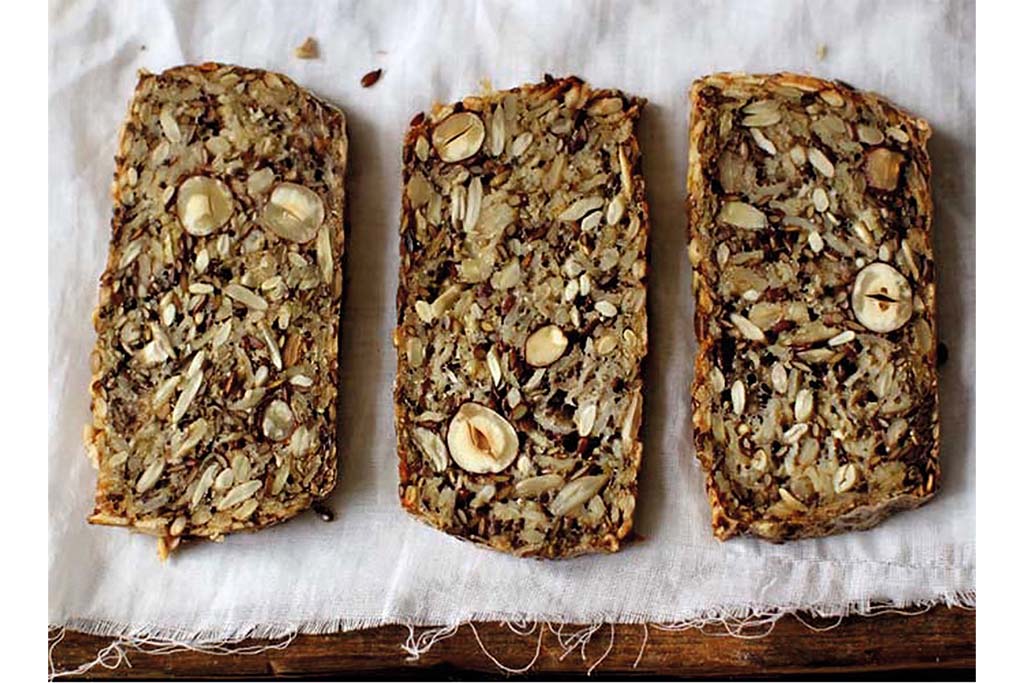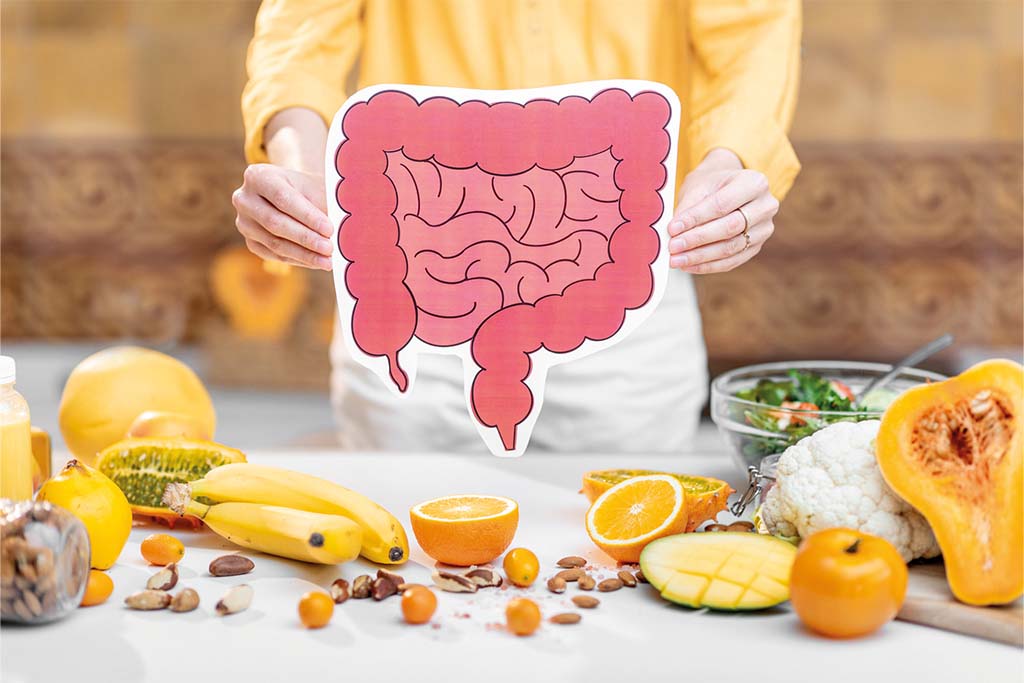Modifying the Microbiome
By
4 years ago

Nutrition guru Tina Lond-Caulk prescribes a gut-friendly diet

A healthy digestive system and, specifically, a healthy gut microbiome (gut bacteria) is fundamental to all aspects of health, including mental wellbeing and inflammation throughout the body. Irrespective of what your symptoms may be, if your digestive system is not working well, the consequences could be far reaching throughout the whole body.
Thousands of publications over the past decade have revealed that the trillions of bacteria in the gut could have profound effects on the brain and might be tied to a whole host of disorders. Preliminary work in humans suggests that microbes can trigger or alter the course of conditions such as Parkinson’s disease, autism spectrum disorder, Alzheimer’s and mental health conditions such as depression. Therapies aimed at tweaking the microbiome could help to prevent or treat these diseases, an idea that some researchers and companies are already testing in human clinical trials. What is exciting is that, unlike your genome, your microbiome is potentially modifiable.
A good indicator of digestive health is how well your bowels function. Ideally, you should be having one or two bowel movements daily. The bowels should empty easily and fully without any urgency but equally no straining. Following a bowel movement, you should feel completely empty. Your stools should be gently formed, not hard little pebbles and not so loose that they have no form. If you do not have bowel movements like this, you need to be addressing the environment within the gut.
Many people suffer from bloating (distention), especially after eating or at the end of the day and acid reflux/heartburn is also very common. These are signs of digestive problems and should not be considered normal. Bloating is often due to an imbalance or a displacement of gut microbes. If the sugar and yeast living microbes, which inhabit all of us, are overly dominant, they can trigger a wide range of symptoms from skin rashes, thrush, fatigue, brain fog, sugar cravings and bloating or distension. Through following our guidelines, the beneficial microbes will become dominant again and allow your digestive function and all its associated systems to work better.
Doctors will often diagnose digestive health problems but rarely offer a permanent solution to symptom relief. Improving the condition of the gut lining, the various digestive secretions such as hydrochloric acid in the stomach, enzymes and bile and supporting healthy gut bacteria will significantly improve function.
Tina Lond-Caulk, founder of The Nutrition Guru is a clinical nutritionist with over 20 years of experience. She also hosts The Food for Life Programme in schools. Her book The Teenage Health and Wellness Guide £13.95 is available from www.thenutritionguru.co.uk

Tips for modifying the microbiome
- Switch off the stress hormones and switch on the digestive processes by taking some deep breaths before starting to eat – when we are stressed, rushing, distracted, we are in ‘fight or flight’ mode, which means our digestive functioning is on hold. By pausing and focusing on your food before you start to eat, you will trigger the ‘rest and digest’ mode. A few slow, deep breaths is an excellent way to achieve this.
- Chew, chew and then chew some more! Focus on what you’re eating. Don’t eat while distracted, on the computer or reading and put your knife and fork down between each mouthful so you eat slowly.
- Stimulate your vegus nerve – imperative for good digestive function from top to bottom. This nerve allows communication from the digestive tract to the brain and vice-versa. To ensure it is working well, try regular gargling – gargle with water for 2 minutes twice a day; singing loudly and, if you can bear it, triggering the gag reflex as often as possible. A healthy microbiome is also essential for good vagus nerve function. A poorly firing vegas nerve can inhibit all aspects of digestion and absorption as well as healing of the gut wall.
- Take time to rest, relax, have fun and get plenty of sleep: stress, fatigue, poor sleep and feeling low and/or depressed are all major triggers for IBS, so focus on lifestyle factors as well as diet. Meditating can be challenging but is beneficial and something definitely worth trying. To help, look into mindfulness training/books or try the app headspace.com as this is a great tool to get your meditating on a daily basis.
- Rest the gut. Try and incorporate regular intermittent fasting in some form, to allow rest and recovery to take place in the digestive system.
How to get things moving better
- Hydration – make sure you are taking in two litres a day of liquids
- Try including more soluble fibre in your diet, such as apples, oats, nuts, beans and pulses, grains
and vegetables - Try soaking chia seeds overnight in milk of your choice, and then add fruits and granola in the morning.
- Move more – make sure you move every day as that stimulates the gut motility (movements enable food to progress along the digestive tract while, at the same time, ensuring the absorption of the important nutrients).
- If you sit down a lot, get up every 45 minutes
- Engage in stress-relieving activities, such as deep breathing, stretching, and/or meditating.

Good gut foods to include in a daily diet
- High quality (long ferment) live natural yogurt for beneficial bacteria.
- Kefir – a different form of fermented dairy, far higher in helpful bacteria than yogurt and easy to make at home
- Raw sauerkraut
- Raw apple cider vinegar. Work up from a teaspoon to a tablespoon in a little water before eating. Use in cooking and salad dressings. Go slowly and aim to include small amounts of different types of fermented foods on a regular basis.
- Bone Broth – good for improving digestive and immune health, incorporate as often as possible. You can boil up meat bones on a low heat (for at least 12 hours). Always add a glug of apple cider vinegar to help extract the minerals from the bones. Freeze your stock in ice cube trays and use as a drinking broth, or put into soups and stews. Slow cooking meatal is far more digestible and benefical so consider buying a slow cooker.
- Stewed Bramley apples are a great pudding or breakfast option with amazing therapeutic properties. Just beneath the skins of these apples is a highly soothing and restorative substance.
- Soaking overnight in water with a little vinegar or lemon juice any grains, pulses, nuts and seeds will greatly reduce irritation and inflammation of the digestive tract. All of these foods contain proteins called lectins, and phytic acid, which are really tough on digestion and trigger inflammation. Freshly ground, soaked flaxseeds and chia seeds are especially beneficial as they produce lots of mucilage, which is very soothing for the gut and helps to ease constipation.
READ MORE FROM AUTUMN/WINTER 2021
Wellness Retreat: Harnessing Peacocks | Food for Thought



